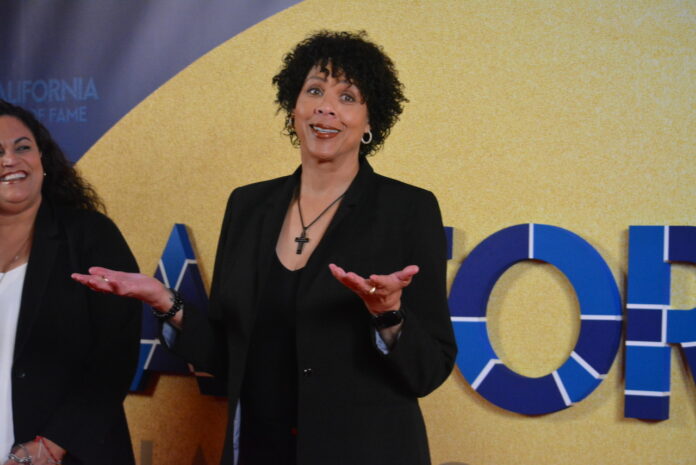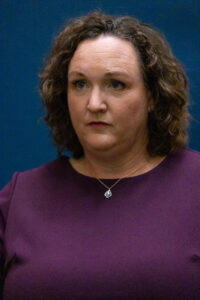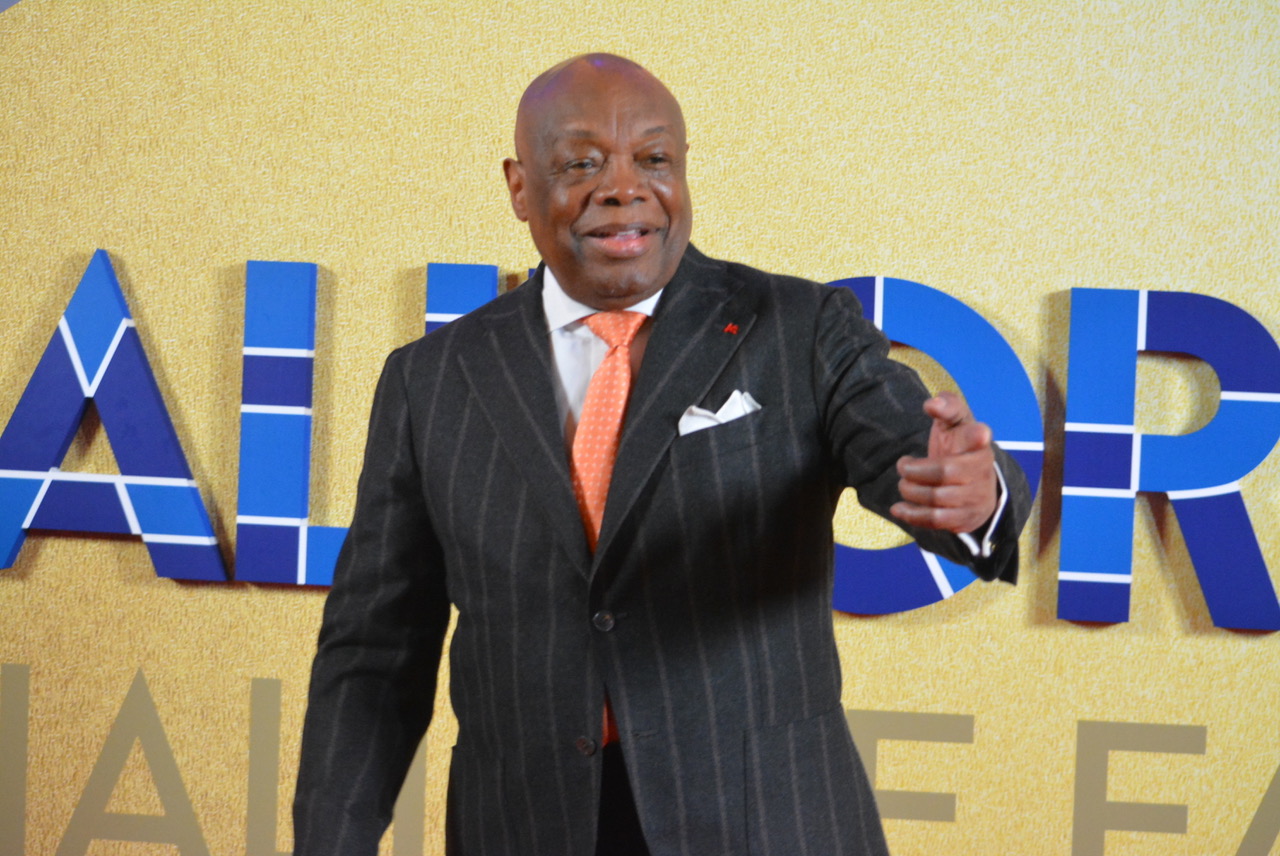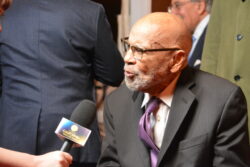
By Tanu Henry, Antonio Ray Harvey and Joe W. Bowers Jr., California Black Media
Asm. Akilah Weber Introduces Bill to Protect Terminally Ill Californians
On Feb. 7, Assemblymember Akilah Weber (D-La Mesa) introduced legislation, Assembly Bill (AB) 2180, designed to ensure that terminally or chronically ill people living in California can afford their life-saving medications.
If passed, the law would require California health plan providers, insurers and pharmacy benefit managers (PBMs) to count the value of financial assistance provided by subsidy programs towards a terminally ill patient’s deductible and out-of-pocket expenses.
“When insurers and PBMs do onto count the value of copay assistance toward cost-sharing requirements, patients often experience “a copay surprise” at the pharmacy counter and may be forced to walk away without their needed medication because they cannot afford it,” wrote Weber in a statement.
Over 80 patient advocacy organizations, medical foundations and other groups applauded Weber for introducing the legislation.
“The All Copays Count in California Coalition commends Dr. Weber for championing legislation that will improve patient access to medications and protect the most vulnerable Californians from harmful and deceptive insurance schemes that raise patient costs,” said Lynne Kinst, Executive Director of Hemophilia Council of California (HCC), which is a cosponsor of the bill.
According to the HCC, an estimated 70% of patients “abandon their prescription medications when their out-of-pocket costs reach $250 or more.
Report: Black Homeownership for 25-35-Year-Olds Has Fallen by More than 50%
A report released last week by the California Community Builders Association (CBCA) presented a grim picture of home ownership for middle income Black Californians and other minorities. The report, titled California’s Missing Middle,” revealed that the rate of homeownership for Black Californians ages 25 through 35 dropped by more than half — from 50% to 23% over a four-decade period, beginning in 1980 through 2021.
During that same period, the rate of homeownership for Latinos also fell significantly — by 22 percentage points, from 52% to 30%.
According to CBCA, the study is based on Census data. It focuses on middle-income Californians because there are rapid shifts happening among that demographic and that sub-group gets the least attention in conversations about homelessness and housing affordability.
“Middle-income California is shrinking, and the drop is all in the lower-middle-income group, from 6.7 million in 2000 to 4.3 million in 2019, a staggering 35% drop,” reads a CBCA press release.
Middle-income Californians also receive the least amount of government funded subsidies aimed at making housing more affordable in the state.
“We have no idea whether these people left the state or changed income brackets. In fact, we know little about the demographics and housing challenges of this group, but the “shrinking middle class” looks real. Knowledge gaps create policy gaps, and we have both,” the CBCA press release continued.
Among key findings in the study are nearly 60% of middle-income Californians are people of color and California housing prices have increased eight times as much as California incomes.
The report recommends that the state create a housing policy that considers the needs of middle-income Californians. The majority of them, according to CCBA, earn too little money to compete in the housing market, yet their income is too high to qualify for income-based subsidies.
“Today, the needs of low-income families are often the primary source of discussion when it comes to housing policy and housing subsidy,” the report reads. “CCB agrees with this perspective and believes low-income families need far greater
support than they receive today, but we also believe that the 17 million middle-income Californians also need care and attention, as our current housing market regularly fails them.”
To Fight Surge in Crime, Gov. Newsom Deploys State Law Enforcement to East Bay
Responding to a surge in crimes in the region, Gov. Gavin Newsom announced on Feb. 6 that he is temporarily increasing state law enforcement personnel in Oakland and the East Bay.
About 120 California Highway Patrol officers are being deployed in the operation – about a 900% increase, according to the Governor’s office.
“As crime rates across California decrease — including right across the Bay in San Francisco — Oakland is seeing the opposite trend,” said Gov. Newsom.
“I’m sending the California Highway Patrol to assist local efforts to restore a sense of safety that the hardworking people of Oakland and the East Bay demand and deserve.”
The CHP officers have been tasked with helping to reduce and prevent auto theft, cargo theft, retail crime, violent crime, and high-visibility traffic enforcement.
“I welcome the support from the Governor in this fight against organized retail crime and the scourge of Fentanyl in our community,” said Alameda County District Attorney Pamela Price. “I am assigning Alameda County career prosecutor Assistant DA Michael Nieto to represent my office in this collaborative effort.”
Oakland Mayor Sheng Thao called the surge in crime “unacceptable.”
“The City of Oakland is hard at work turning the tide — increasing law enforcement investigations, increasing police recruitment, and investing in community and violence intervention efforts,” said Thao. “As we work to improve public safety, I’m grateful for Governor Newsom for providing these critical law enforcement resources that are a game-changer in helping us hold more criminals accountable and make Oakland safer.”
California Senate Candidates Discuss Representation in Forum With Ethnic Media
On Feb. 8, the three leading Democratic California Senate candidates participated in a

forum to discuss their campaign platforms and field questions from reporters about issues concerning California residents.
U.S. Representatives Barbara Lee (D-CA-12), Adam Schiff (D-CA-30), and Katie Porter (D-CA-47) – joined the virtual event that was hosted by California Black Media and Ethnic Media Services,
An invitation was extended to former Major League Baseball player and Republican Steve Garvey to the participate but there was no response from his staff.
It is likely that one of the three candidates that took part in the forum will be California’s next junior Senator, serving alongside senior Sen. Alex Padilla. That person will replace Sen. Laphonza Bulter, who is currently the only Black woman in the 100-member U.S. Senate.
One of the questions directed to all the candidates was about how they would ensure that Black women’s voices would continue to be considered in national debates and policymaking.
Lee said Black women legislators “fight for everyone.”

“It is important that they serve in the Senate to have that perspective or that lens that would be missing in the United States Senate,” Lee said, talking about the point of view of Black women, who are the Democratic Party’s most loyal voting bloc.
“It is ‘not just on issues of racial justice, it’s also on issues of equity, economic equity. When you look at billionaires, we have to pass legislation which I’m championing with Senator Sanders, the oligarch Act, the CEO compensation act – bills that will force billionaires to pay their fair share,” said Lee. “A black woman’s perspective on every single issue is very important.”
Porter said she would “work tirelessly” to make sure that Butler would not be the last Black female Senator when she finishes the interim term. Gov. Gavin Newsom appointed Butler after longtime Senator Dianne Porter said California’s next senator needs to be “a champion for communities of color, particularly for Black Americans.
“Washington has long overlooked the needs of hard-working Americans, especially communities of color, including long standing racial gaps in homeownership and education and healthcare. We know that Black Americans have worse health outcomes. They’re less likely to graduate from college. They’re more likely to live in polluted neighborhoods. The question is what is Washington going to do about that?” asked Porter.
Schiff took a different approach to the question. He intends to appoint more Black women and people of color to the judiciary, cabinet positions, and intelligence community such as the Central Intelligence Agency (CIA) and the National Security Agency (NSA).
“In every aspect of policy, and every appointment I have to make, I want to make sure that we’re elevating people that look like America, that will be representative of every community in America,” Schiff said. “And that very much means Black women and Black

men, people from the Latino community and the AAPI community, people in the LGBTQ community as well.”
Reporters from CBM, EMS, India Currents, and La Opinion formulated the questions for the briefing.
The candidates also fielded questions about the border crisis, funding Ukraine funding,
single-payer health insurance, the expansion of the Federal Child Tax Credit, sponsoring bills to protect local journalism, legal immigration relief to essential undocumented workers, legal immigration relief to essential undocumented workers, climate change, reparations for Black Californians, among other topics.
After Severe Storms Kill 12, State Warns of Ongoing Dangers
State authorities and elected officials around California are thanking 8,500 first responders for their combined efforts over the past weeks to save lives during severe storms that killed 12 people, contributed to intense flooding, led to power outages, downed trees and caused more than $10 million in damages.
They are also directing Californians to resources to address losses they may have suffered during the storms and warning them of ongoing dangers.
“We mobilized an all-of-government response, including our swift water rescue teams that have made 47 rescues,” said Gov. Gavin Newsom. “We’re grateful to our thousands of first responders who have saved countless lives and kept our state going in the face of record-breaking rainfall and snow.”
On Feb. 4, the Governor declared a state of emergency in eight counties: Los Angeles, Ventura, Orange, San Bernardino, San Luis Obispo, Santa Barbara, Riverside and San Diego.
On Feb. 7, Newsom followed up by requesting a major disaster declaration from the White House to support San Diego County as it recovers from the storms.
“The late January storm saw record-breaking rain in San Diego, where the worst impacts were felt in lower-income neighborhoods. Many folks saw damage to their life’s work that can’t be recovered without federal support,” the Governor said.
On Feb 10, the Governor’s Office for Emergency Services (CalOES) provided safety tips for returning home aimed at Californians who had to evacuate, including how to deal with accumulated muck, mud and debris.
In Sacramento County, a 63-year-old woman was found dead under a large fallen tree in her backyard.
Effects of recent storms can weaken trees, leading to falling branches or even entire trees, which can cause damage to homes, and vehicles and pose a threat to public safety, according to Cal OES.
The sudden occurrence of toppled trees, fallen branches or uprooted trees saturated by standing water creates hazardous conditions for pedestrians, motorists, power lines, and homes.
CalOES is urging Californians to stay informed about whether forecasts, and informed the public that it is still assessing storm damages.
Gov. Newsom and First Partner Jennifer Siebel Newsom Host 2024 Hall of Fame Ceremony
Former Assembly Speaker and San Francisco Mayor Willie Brown and three other African Americans were among 10 luminaries inducted into the 2024 Class of the California Hall of Fame on Feb. 8.

The 17th Annual California Hall of Fame ceremony was held at the California Museum.
“The California Hall of Fame is one of our families’ favorite traditions as it is a time to come together to celebrate remarkable Californians as well as their loved ones because we know that it is about partnerships,” Siebel Newsom said. “The governor likes to say that California is a dream factory because it doesn’t matter what zip code or background you come from, the California dream is alive and well to everyone who calls this state home.”
The other Black honorees were filmmaker Ava DuVernay; Federal Judge and civil rights leader, the Hon. Thelton Henderson; and basketball Hall of Fame player and broadcaster Cheryl Miller.
“It’s what I’ve been waiting for and to be among a great group of individuals that also deserve the honor,” Brown told California Black Media on the event’s red carpet before the ceremony began. “No, I never thought someone from Texas would be recognized this way. But here I am, and it all happened in the great state of California. It’s a fantastic feeling.”
Other 2024 inductees are: master chef and “mother of fusion cuisine” Helene An; computer scientist and “father of the internet” Vincent A. Cerf; all-female pop punk band The Go-Gos; Chicano Rock band Los Lobos; former U.S. Secretary of
Defense and Congressman Leon E. Panetta; and artistic director and choreographer Brenda Way.
This year’s honorees join a history-making club with over 150 inspirational Californians previously inducted for their groundbreaking achievements and personifying the state’s innovative spirit.
“It’s just a humbling experience. I want to thank the Governor and First Partner. Who would

have thought 100 years ago (that I would be inducted?) It’s incredible,” Miller said after her induction. “I want to thank the governor and First Partner for an incredible event.”
During his acceptance speech, Henderson said he was deeply honored.
“You know, it really would have been a really big deal to be inducted into the Hall of Fame in the area where I grew up, for example, South Central Hall of Fame, or the Watts Hall of Fame, or the Straight Out of Compton Hall of Fame,” he said. “But being inducted into the California Hall of Fame, Hall of Fame of the greatest state in the country in this great nation is something else.”



